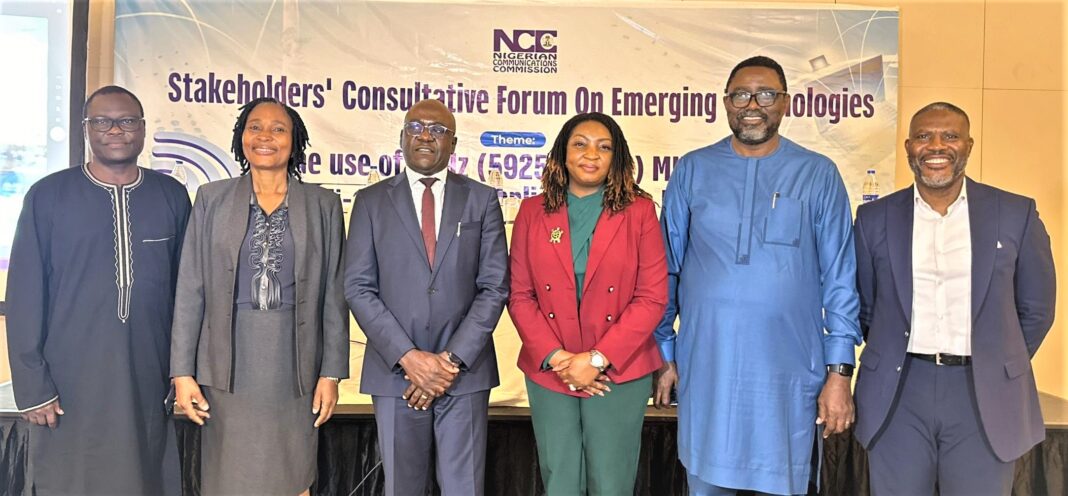The Nigerian Communications Commission (NCC) is holding consultations with stakeholders in bids to harness the 6GHz spectrum to boost internet speed across the country.
According to the EVC of NCC, Dr Aminu Maida who spoke during a stakeholders Stakeholders’ Consultative Forum on Emerging Technologies in Lagos on Thursday, said the bid marks a significant step in addressing the growing demand for high-speed internet in Nigeria.
Dr. Aminu Maida, who was represented by the Executive Commissioner Technical Services, Abraham Osadami said the move to deploy the 6GHz spectrum was driven by capacity constraints in the current 5GHz and 2.4GHz frequency bands.
“The 6GHz band, spanning from 5925 MHz to 7125 MHz, provides a substantial increase in available spectrum,” said Maida. “This is crucial for supporting the increasing demand for high-speed internet and advanced digital applications.” He further emphasized that Nigeria would be joining a global trend, with numerous countries already utilizing the 6GHz band for Wi-Fi 6 applications.
Wi-Fi 6 is designed to improve connectivity by offering higher data throughput, reduced latency, and the ability to handle large amounts of data—particularly in environments such as homes, offices, and public spaces. Maida noted that Wi-Fi remains a critical component of broadband distribution in Nigeria, with the majority of home internet traffic relying on Wi-Fi connections.
Atiku Lawal, Head of Spectrum Administration at the NCC, highlighted the limitations of existing Wi-Fi spectrums in the 2.4GHz and 5GHz bands, noting that they are becoming overcrowded. “It’s not surprising that over seventy countries have either acted or are considering opening the 6GHz band for unlicensed Wi-Fi use,” Lawal said. He added that this expansion would provide two to three times more spectrum than currently available, enabling the implementation of larger channels suitable for emerging technologies like high-definition video and extended reality (XR).
“The commission’s decision to open the 6GHz frequency band for unlicensed Wi-Fi use is poised to revolutionize broadband connectivity in Nigeria,” Lawal added. He explained that the adoption of Wi-Fi 6 would significantly enhance internet services, offering faster and more reliable connections, especially in high-demand environments such as stadiums, airports, and offices
The NCC also aims to offload some internet traffic from cellular networks to Wi-Fi 6, which will help alleviate capacity constraints and further boost broadband penetration in Nigeria. Lawal stressed that the expanded spectrum would support digital transformation efforts, making Nigeria better equipped to handle emerging technologies and high-demand use cases.
During the forum, the Chairman of the Association of Licensed Telecoms Operators of Nigeria (ALTON), Gbenga Adebayo, urged the federal government to assist telecom operators in upgrading their infrastructure to benefit from the 6GHz spectrum. Represented by ALTON’s Executive Secretary, Gbolahan Awonuga, Adebayo pointed out that operators are struggling financially to expand their networks amid the challenging economic environment.
“We need financial support to upgrade our infrastructure and import the necessary equipment to take full advantage of the 6GHz band,” Adebayo said, calling on the government to intervene in order to help operators meet the rising demand for high-speed internet.
Globally, the 6GHz band is gaining attention as a key asset for future connectivity. The GSMA, the global organization for mobile network operators, recently called on governments to allocate the 6GHz spectrum for mobile use. The organization believes that this band holds the potential to drive economic growth and meet the increasing demand for mobile data consumption.
By leveraging the 6GHz spectrum, mobile operators can expand capacity on existing infrastructure, enabling more cost-effective network deployment and supporting the next generation of mobile services, including 5G and beyond.
The NCC’s move to open the 6GHz spectrum is expected to pave the way for faster, more reliable internet in Nigeria, driving the country’s digital transformation and setting the stage for future technological advancements.
L-R: Executive Secretary, Association of Licensed Telecom Operators of Nigeria, Gbolahan Awonuga; Professor of Telecommunications Engineering, Federal University of Technology, Minna, Prof. Caroline Alenoghena; Executive Commissioner, Technical Services, Nigerian Communications Commission (NCC), Abraham Oshadami; Public Policy Manager, Anglophone West Africa, Meta, Sade Dada; Director, Compliance Monitoring and Enforcement, NCC, Efosa Idehen and President, Association of Telecom Companies of Nigeria, Tony Emoekpere, during a Stakeholders’ Consultative Forum on Emerging Technologies hosted by the Commission in Lagos on Thursday (September 19, 2024).












